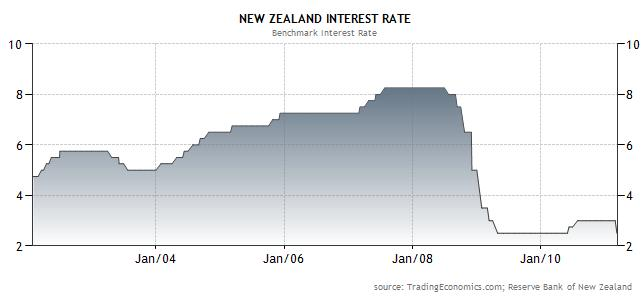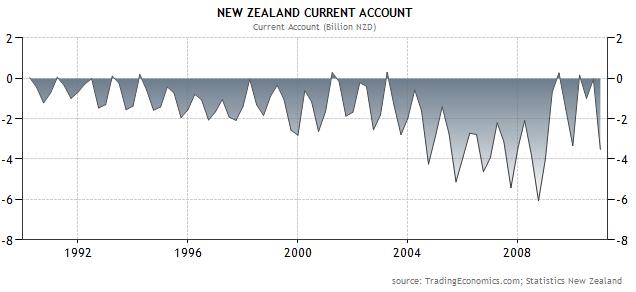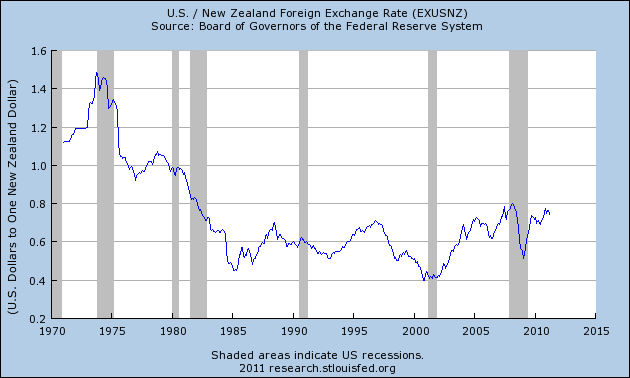New Zealand Dollar: Come Back to Earth!
In March, I wondered aloud about whether the New Zealand Dollar might be the most overvalued currency in the world. Since then, it has continued its unlikely ascent, rising 10% on a correlation-weighted basis and 3% against the US Dollar, hitting a 26-year high in the process. While there are signs that the New Zealand economy might be able to withstand an expensive currency, at some point, the chickens must come back to roost.
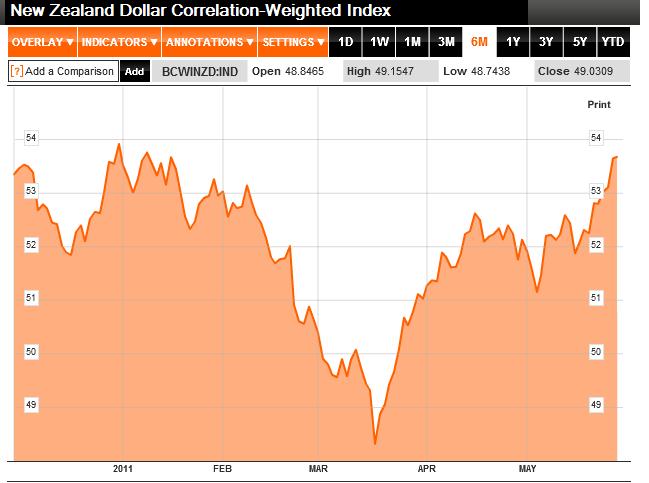
Surely the expensive kiwi must be wreaking havoc on the New Zealand dollar? “How is New Zealand supposed to rebalance its economy away from consumption, importing, borrowing and asset selling towards investment, production, exporting and asset buying when our currency is headed for record highs?” Wonders one commentator. In fact, exporters are coping just fine, and New Zealand just recorded its highest quarterly trade surplus on record. Never mind that this is due almost entirely to soaring prices for commodities and unflagging demand. In spite of two earthquakes and other related downside factors, the New Zealand economy is nonetheless forecast to grow by 2.3% in 2011.
On the other hand, New Zealand’s current account deficit continues to rise, as foreign investors pour in to New Zealand to make acquisitions, portfolio investment, and loans to the government. New Zealand’s largest dairy conglomerate could soon be sold to Chinese investors, while China’s sovereign wealth fund (which manages a portion of the country’s sprawling forex reserves) has announced plans to purchase a big chunk of New Zealand government debt. This is just as well, since a record 2011 budget deficit will require a significant issuance of new debt.
Meanwhile, New Zealand price inflation is currently 4.5%, which means that the country’s real interest rate is -2%, certainly among the lowest in the world. Moreover, even as two-year inflation expectations tick up, rate hike expectations remain unchanged. The consensus is that the Reserve Bank of New Zealand will avoid hiking its benchmark until the first quarter of 2012. Regardless of what happens in the interim, it seems unlikely that Bank president Alan Bollard will give in, for fear of stoking further speculative interest in a currency that is already “undesirably high.”
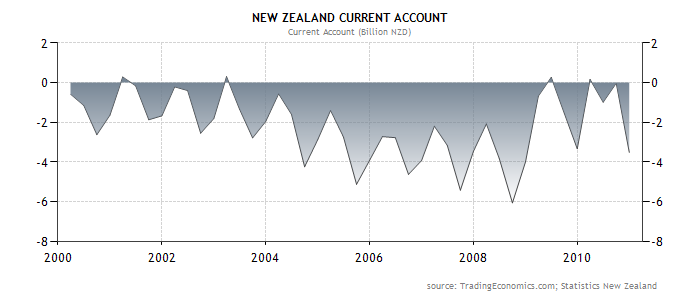 Let’s review: record low interest rates and record low real interest rates. Record budget deficit. Large current account deficit. Declining expectations for GDP growth. Record high New Zealand Dollar. Does anyone see a contradiction here? It’s no wonder that the IMF recently speculated that the Kiwi might be overvalued by as much as 20%, echoing the sentiments of yours truly.
Let’s review: record low interest rates and record low real interest rates. Record budget deficit. Large current account deficit. Declining expectations for GDP growth. Record high New Zealand Dollar. Does anyone see a contradiction here? It’s no wonder that the IMF recently speculated that the Kiwi might be overvalued by as much as 20%, echoing the sentiments of yours truly.
At the same time, commentators concede that “The New Zealand dollar or any currency can deviate for a long period of time from academic measures of valuation.” And that is why making fundamental bets on currencies is so difficult. Even if all signs point to down (as is basically the case here), a currency can continue rising for many more months, before suffering a massive correction. For what it’s worth, this is the fate that the New Zealand Dollar is resigned to. Whether it will happen tomorrow or next year, alas, will depend more on global macroeconomic factors (such as the ebb and flow of risk aversion) than on what happens in New Zealand.


